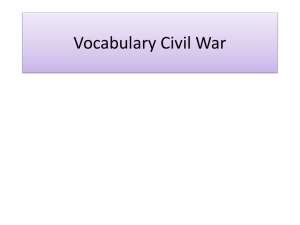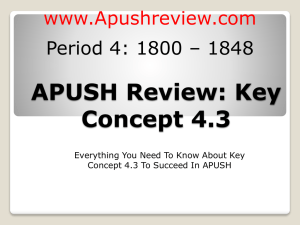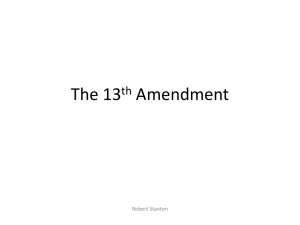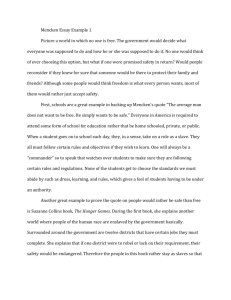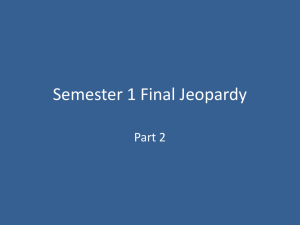B - Henry County Schools
advertisement
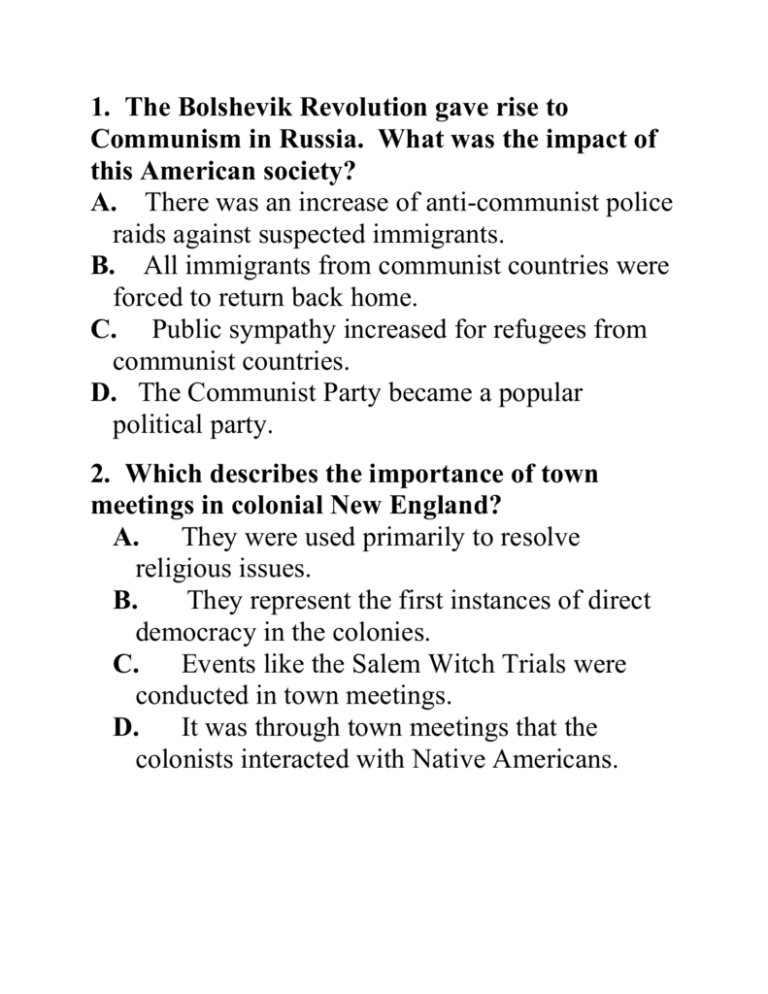
1. The Bolshevik Revolution gave rise to Communism in Russia. What was the impact of this American society? A. There was an increase of anti-communist police raids against suspected immigrants. B. All immigrants from communist countries were forced to return back home. C. Public sympathy increased for refugees from communist countries. D. The Communist Party became a popular political party. 2. Which describes the importance of town meetings in colonial New England? A. They were used primarily to resolve religious issues. B. They represent the first instances of direct democracy in the colonies. C. Events like the Salem Witch Trials were conducted in town meetings. D. It was through town meetings that the colonists interacted with Native Americans. 3. How did the colony of New York form? A. Persecuted religious groups from England settled there. B. French merchants set up a prosperous trading port there. C. The Duke of York founded it after taking Iroquois land in several wars. D. The British created it after taking the Dutch settlement New Amsterdam. Use the following quote to answer question #4: “While I agree that power must be divided among several branches of government, I cannot agree to this plan. It proposes that both houses of the legislative branch be composed of representatives from each state. That is fine and good. But it also proposes that, in each house, the number of representatives for each state is to be based on population. Should we the smaller states have less of a voice in our own government? No! To approve this plan would be to impose a form of tyranny onus again. What good is representation if it is destined to mean nothing?” 4. The above quote is MOST LIKELY from whom? A. a delegate to the First Continental Congress from a small colony B. a delegate to the Constitutional Convention who is protesting the New Jersey Plan C. a delegate to the Second Continental Congress who is opposing the Constitution D. a delegate to the Constitutional Convention who is opposing the Virginia Plan Use the following flow chart to help answer question #5: 5. Which statement should go in the box at the top to complete the cause and effect chart? A. Development of African trade routes with European powers. B. America’s increased desire to establish colonies in Africa. C. England sends Ambassadors to open relations with Africa. D. Growth of the African population in America due to slavery. 6. Roger Williams, Anne Hutchinson, and Thomas Hooker all had which in common? A. They were each executed as witches during the Salem Witch Trials. B. They founded other colonies in New England after leaving Massachusetts over disagreements with Puritan church leaders. C. They each played key roles in the Atlantic Slave Trade. D. They left New England and spread Puritanism to the Middle and Southern Colonies. 7. How did the Warren Court’s Miranda decision expand the legal rights of individuals? A. Suspects became protected against evidence that had been improperly obtained. B. Suspects would now be protected against selfincrimination upon being arrested. C. Any arrested suspect would automatically be assigned a court-appointed attorney. D. Suspects were officially considered innocent until proven guilty. 8. What was the significance of Thomas Paine’s pamphlet Common Sense? A. It presented a convincing case for independence, using plain language. B. It counteracted the Great Awakening by arguing against religion. C. It clearly described how increased trade could benefit the colonies. D. It considered early arguments against using slave labor in America. 9. John Locke was influential to the drafting of the Declaration of Independence because his A. belief in conquering the entire continent was popular here but opposed in England. B. belief that Americans were unique from Britons motivated colonists to seek freedom. C. theory that all taxes were unjust and should be banned was popular with the signers. D. theory that rulers needed the consent of citizens inspired and justified the document. 10. What role did France play in the American Revolution? A. It made a pact with Spain to divide American territory after the war. B. It sold weapons and services to both sides in order to make a profit. C. It allied itself with the revolutionaries in order to weaken Britain. D. It assisted the British, for its rulers feared a similar French revolution. 11. How was the geographical location of Yorktown pivotal to General Washington’s decisive victory there during the American Revolution? A. It was far inland, so supplies and reinforcements couldn’t arrive from the sea in time. B. It was surrounded on all sides by trees and hills, giving Washington’s soldiers ample cover. C. It was on the coast, and French ships blockaded it during the Continental Army’s assault. D. It was in the valley of the Appalachian mountains, giving the colonists elevated positioning. 12. The Articles of Confederation proved to be an ineffective body of laws for what reason? A. The United States had not yet declared independence at the time they were ratified. B. The Articles gave too much power to the central government, causing many colonists to rebel. C. The Articles did not give enough power to the federal government for it to lead effectively. D. None of the states would agree to ratify the Articles of Confederation. 13. How did the Whiskey Rebellion affect George Washington’s Presidency? A. It showed his skills in negotiating state interests in Congress. B. It exposed the President as powerless to intervene in state and local matters. C. It forced him to utilize a national army to stop domestic unrest. D. It made his popularity legendary once he repealed the unpopular Whiskey Tax. 14. Meriwether Lewis and William Clark were important to westward expansion because they A. set up many permanent settlements in the west. B. eliminated all Native American threats in the west. C. negotiated the price and timing of the Louisiana Purchase. D. explored and mapped out the area received in the Louisiana Purchase. 15. The Monroe Doctrine was important to American history because it A. expressed America’s willingness to intervene in the internal conflicts of Europe B. directly opposed further European colonization anywhere in the world C. showed that the United States would protect the Americas as a sphere of influence D. accepted Spanish and French expansion in the Americas in order to form an alliance 16. What effect did the cotton gin have on the South’s economy? A. It made the South more industrialized than the North. B. It increased the South’s dependence on slave labor. C. It decreased the South’s dependence on foreign trade. D. It led to the end of the plantation system. 17. A U.S. congressman in the 1840s who favored western expansion on the grounds that it was God’s will for the United States to control and “civilize” the territory from the Mississippi river to the Pacific coast was undoubtedly a believer in what? A. Civil liberties B. Manifest Destiny C. Monroe Doctrine D. the Oregon Trail 18. How did the Missouri Compromise affect the expansion of slavery into western territories? A. It allowed slavery only in Missouri and western territories south of Missouri. B. It permitted Missouri to have slaves but forbade slavery in all other Western territories. C. It forced Missouri to be a free state but permitted western states to choose slavery. D. It allowed all western areas to become slave states as long as they didn’t outnumber free states. Use the following list to answer question #19: Organization of the Utah Territory The division of Territory in Texas Admitting California to the Union Returning Fugitive Slaves in all states 19. The items in this list are territorial issues that are related directly to the A. Great Compromise. B. Compromise of 1850. C. Missouri Compromise. D. Compromise of 1820. 20. President Abraham Lincoln’s Gettysburg Address primarily expressed A. his personal disgust at southern racism. B. boastful pride about the Union’s military might. C. profound regret about the Civil War’s violence. D. his determination to maintain the Union. 21. A U.S. senator from Connecticut introduces a bill using government regulations to help New England manufactures. President Andrew Jackson will MOST LIKELY A. oppose the bill B. support the bill C. have no opinion on the bill D. sign the bill 22. How would a congressman from Georgia MOST LIKELY have voted regarding the Wilmot Proviso? A. He would have opposed it. B. He would have supported it. C. He would have abstained from voting for fear of causing controversy. D. If he were from Atlanta, he would have supported it; but if he were from s rural area, he would have opposed it. Use the following chart to answer question #23: 23. Which conclusion is supported by the data in the chart? A. Heading into the Civil War, the North was guaranteed to win. B. The North had more industry because they did not use slave labor. C. There was great economic disparity between the North and the South. D. During the Civil War, the South relied mainly on industry for their economy. 24. The Missouri Compromise, Wilmot Proviso, and Compromise of the 1850 were all designed to A. end slavery in the South B. emancipate slaves C. extend slavery to new U.S. territories D. deal with the issue of slavery in new territories. 25. Use the following quote to answer question #25. “I am outraged by this decision! How can the judicial branch of government take it upon itself hand down a decision that, in effect, declares men to be mere property rather than human beings? God will hold them responsible. More than that, regardless of what the Court says, God will judge any man who holds another in bondage when he has the power to set him free.” The above statement MOST LIKELY comes from which of the following? A. A member of the Confederate government, protesting the Emancipation Proclamation. B. A member of Congress who supports popular sovereignty protesting the Dred Scott decision. C. An abolitionist protesting the Dred Scott decision. D. A Democrat protesting the election of Abraham Lincoln. Use the following list to answer question #26: Ended Confederate hopes of successfully invading the South Stonewall Jackson was sorely missed Bloodiest battle of the entire war major turning point 26. What battle is the above list referring to? A. Gettysburg B. Antietam C. Bull Run D. Chancellorsville 27. The expansion of the railroad industry in the 1800’s was a positive development for A. Native Americans who got jobs from the railroads. B. other industries, like steel, who provided resources to the railroad companies. C. poor Americans who could now afford to travel west on the free cars. D. Lewis and Clark because it made their expedition more efficient. 28. How did Standard Oil attain its immense wealth? A. It encouraged unions in order to keep the most competent and productive workers. B. It consolidated power by taking over its competitors and becoming a monopoly. C. It acted for several years as the only oil company to export oil to other countries. D. It was the first oil company to drill for oil in the Northeastern United States. 29. Which is a Thomas Edison invention that had an impact on American lives? A. telephone B. telegraph C. cotton gin D. light bulb Use the following list to answer question #30: New York Harbor Over 12million immigrants during late 1800’s-early 1900’s Intense health inspections 30. The list above BEST describes which location? A. Jamestown B. Fort Sumter C. Ellis Island D. Panama Canal 31. The government’s role in early labor disputes can BEST be described as what? A. supportive of business out of concern that strikes could adversely affect the nation B. supportive of workers out of concern that business owners were failing to protect worker’s rights C. restrained, choosing to let labor and business owners work out their own solutions D. disinterested, because the labor disputes were a matter of private enterprise 32. Samuel Gompers is MOST remembered as A. the leader of the Pullman Strike. B. a supporter of federal injunctions. C. the leader of the AFL. D. the president who sent in federal troops to end the Pullman Strike. 33. How did Upton Sinclair’s book The Jungle address social issues important to the Progressive Movement? A. It pointed out that women weren’t being treated like humans when denied suffrage. B. It showed how lax regulations in the food industry endangered public health. C. It explained why national forests and wildlife needed to be preserved. D. It gave a realistic portrayal of racial tension in the Southern states. 34. How did the Supreme Court’s decision in Plessy v. Ferguson affect African-Americans? A. It extended the 14th Amendment to private individuals. B. It permitted the segregation of blacks and whites. C. It prohibited more Jim Crow laws from being passed. D. It allowed poll taxes to be applied to blacks. 35. Why would a majority of poor people living in cities in the late 1890s and early 1900s be likely to support progressive leaders? A. Progressive leaders promised to get everyone a job and safe house by 1920. B. Almost all of the progressive leaders were poor, city dwellers with little education. C. Most progressives sought to resolve problems caused by industrialism and urbanization. D. Unlike politicians, progressives sought to resolve problems without using any government help. 36. Ida Tarbell is BEST described as a A. social worker. B. muckraker. C. progressive politician. D. founding member of the NAACP. Use the following quote to answer question #37: “…in the Western Hemisphere the adherence of the United States to the Monroe Doctrine may force the United States…to the exercise of an international police power.” The Growth Of the United States 37. The quote above BEST states the position of the A. Roosevelt Corollary B. Seneca Falls Conference C. Chinese Exclusion Act D. Declaration of Independence 38. World War I contributed to the Great Migration by prompting millions of African Americans to A. leave the country in order to avoid being drafted. B. relocate to farms, which paid much more in wartime. C. settle on the east coast as for purposes of national defense. D. move into urban areas to fill newly available industrial jobs. 39. Woodrow Wilson supported the creation of the League of Nations in order to A. form an alliance against the new, expanding Soviet Union B. prevent another global conflict like the first World War C. colonize unconquered territories in Asia and Africa D. establish an American military presence in Europe 40. The Eighteenth Amendment effectively A. established a beginning date for the terms of elected federal officials. B. banned the transport, sale, and manufacturing of alcohol in America. C. permitted alcohol to be sold and consumed after its prohibition. D. imposed an income tax on all citizens of the United States. 41. Henry Ford had a great impact on American society by A. further dividing the classes by making only a few cars for wealthy buyers. B. discovering a way refine crude oil into cheap gasoline for automobiles. C. developing numerous railroad systems that connected the entire country. D. using an assembly line to mass-produce cheap and efficient cars. 42. How did Langston Hughes contribute to African-American Culture in the 20th Century? A. He was a popular urban progressive politician. B. He was an innovative musician who created jazz. C. He was a prominent poet in the Harlem Renaissance. D. He was the founder of the Back to Africa Movement. 43. Eleanor Roosevelt’s conduct as first lady can BEST be described as A. active and controversial B. traditional C. universally offensive D. perceived as favoring the rich and powerful 44. President Franklin Roosevelt established the Tennessee Valley Authority in order to A. build railroads, renovate cities, and improve schools in the Southeast. B. tear down rich forests and use their lumber to fund welfare programs. C. provide employment, cheap electricity, and flood control in the South. D. put down civil unrest in the Southern states with a military presence 45. How did the Wagner Act of 1935 promote American labor unions? A. It forced the formation of unions upon industries with government contracts. B. It merged the AFL with the CIO to create a powerful nationwide federation of unions. C. It allowed secret elections in factories to see if workers wanted to unionize. D. It granted tax breaks to factory-owners who allowed employees to unionize. 46. What effect did the Battle of Midway have? A. It prompted Hitler to commit suicide. B. It enabled the Allies to finally open a second front in Western Europe. C. It turned the tide of the war in the Pacific in the United States’ favor. D. It gave Japan the upper hand, but only briefly. 47. The intention to provide direct relief and exercise deficit spending were both part of A. U.S. isolationism. B. Hoover’s economic plan. C. the New Deal. D. Black Tuesday 48. In the D-Day operation, the allies in World War II successfully A. launched an air assault on German cities. B. liberated the Nazi’s concentration camps. C. overthrew Mussolini and made Italy an ally. D. invaded Nazi-occupied France at Normandy. 49. What was the purpose of U.S. internment camps? A. to protect Japanese, German, and Italian American citizens from racists who might harm them B. to provide a place to train soldiers to fight in WWII C. to allow a secluded place for scientists to work on the atomic bomb D. to keep a close eye on any citizen who might be threat to the U.S. war effort 50. President Roosevelt referred to December 7, 1941 as “…a day which will live in infamy…” because it was A. the day Allied troops invaded France B. the day marking the fall of France C. the day Berlin fell to the Soviets. D. the day the Japanese bombed Pearl Harbor 51. An African American who benefited from the Fair Employment Act would be MOST thankful for the efforts of A. Winston Churchill B. Dwight Eisenhower C. A. Philip Randolph D. Douglas MacArthur 52. How did the Marshall Plan help stabilize Europe after World War II? A. It pardoned most enemy soldiers in exchange for their cooperation. B. It proposed dividing Germany into two countries to appease Russia. C. It provided financial aid and supplies to countries suffering after the war. D. It established an active American military presence in unstable areas. 53. How did the spread of communism after World War II aid in Joseph McCarthy’s rise to prominence? A. He exploited the public’s hysteria and held show trials to boost his own political career. B. He united blacks and whites through a hatred of communism and encouraged civil rights. C. He won public admiration for his military leadership in fighting communists in Korea. D. He manipulated paranoia to sell nuclear weapons to the United States and Soviet Union. 54. Why was the Tet Offensive an important event in the Vietnam War? A. It marked North Vietnam’s permanent capture of South Vietnam’s capitol. B. It stirred up strong disagreement among Americans about the Vietnam War. C. It forced Lyndon Johnson to escalate the conflict by bombing bases in Cambodia. D. It made the United States improve relations with China for military assistance. Use the picture below to answer question #55 55. The picture above is a symbol for which of the following? A. Japan B. North and South Vietnam C. North and South Korea D. the iron curtain dividing Europe after WWII 56. What is the relationship between the baby boom and the Interstate Highway act? A. The baby boom increased the number of people living in suburbs, which increased the demand for highways. B. The Interstate Highway act was designed to stop people from using the highways to move to suburbs. C. Because of the large population increase, only Interstates could be used to move people around. D. Most new places to live were only accessible by the new Interstates. 57. During Earl Warren’s tenure as U.S. Chief Justice A. Prohibition was repealed. B. There was an expansion of civil rights and liberties. C. There were greater restrictions on individual freedoms. D. There was greater concentration on the rights of corporations. 58. Competition with the USSR during the “space race” was beneficial to the United States because it A. prevented any other country from developing nuclear weapons. B. led to increase investments in math and science education. C. eventually led to the Cuban Missile Crisis. D. caused more emigration from the USSR. 59. How did Brown vs. Board of Education help shape the Civil Rights Movement? A. It confirmed the states’ right to enforce policies of segregation. B. It ruled that “separate but equal” policies were unconstitutional. C. It excused blacks from taxes for public services they could not use. D. It considered non-violent protest a criminal act that could be prosecuted. 60. One result of Johnson’s Great Society was an increase in demand for elderly and geriatric nursing. This was largely because of the A. establishment of Medicare. B. Civil Rights act of 1964. C. funding used for the Head Start program. D. Economic Opportunity act. 61. The presidential debates between John F. Kennedy and Richard Nixon in 1960 demonstrated A. the effect of opening relations with China on public opinion B. the importance of radio to the outcome of the election process C. the impact the Bay of Pigs Invasion on the candidates’ position D. the power of television to shape public perceptions about candidates 62. In the 1960’s, the Student Nonviolent Coordinating Committee (SNCC) and the Southern Christian Leadership Conference (SCLC) disagreed about A. the tactic of sit-ins B. the public role of religion C. the practice of nonviolence D. the censorship of public debate 63. Which statement describes the correct cause and effect regarding the environmentalist movement in the United States? A. Rachel Carson’s Silent Spring sparked early interest in environmental issues. B. The Environmental Protection Agency hired Rachel Carson to investigate issues for Silent Spring. C. Earth Day celebrations around the country led to the need to create the Environmental Protection Agency. D. The first Earth Day celebration encouraged Rachel Carson to write Silent Spring. 64. Richard Nixon was A. a president who took a hardline military stand against the Chinese and enthusiastically supported civil rights legislation. B. the first president to publicly recognize Communist China and eventually resigned due to a scandal. C. the only man ever to serve as both president and vice president without being elected to either office. D. a former governor of Georgia who went on to become president and improve relations with Communist nations. 65. Jimmy Carter was praised for which of the following A. Watergate B. his handling of Iranian hostage crisis C. the Camp David Accords D. instituting WIN 66. Assume a publishing company approaches Bill Clinton and wants him to write a book about passing laws concerning international economics. Which of Clinton’s achievements BEST qualifies him to write this book? A. His impeachment B. the support and passage of NAFTA C. passage of a national healthcare plan D. involvement in the Iran-Contra scandal 67. Which is one reason why the results of the 2000 Presidential election were controversial? A. Al Gore’s running mate defected from the Democratic Party during the election. B. George Bush won the majority of electoral votes but lost the popular vote. C. Numerous electors pledged to Al Gore declined to vote for him, causing his defeat. D. George Bush and his running mate were both from Texas, a violation of law. 68. President Bush authorized Operation Enduring Freedom A. in hopes of liberating Iraq. B. in response to the 9/11 terrorist attacks. C. in an effort to find Saddam Hussein’s weapons of mass destruction. D. in an attempt to establish a federal department in charge of homeland security. Use the following list to answer question #69: Easy access to water Good location for the capital of New France Provided permanent place for the French to conduct fur trade with Native Americans 69. The list above describes the A. location of New Amsterdam. B. French and Indian War. C. Louisiana Purchase. D. French settlement of Quebec. 70. During the 16th and 17th centuries many European countries adopted the belief that the best way to have a prosperous country was to heavily regulate the economy and limit imports from other countries while trying to accumulate as much gold and capital as possible. What is the name for this set of practices? A. trans-atlantic trade B. imperialism C. mercantilism D. nationalism 71. A poor Pennsylvania grain farmer in the early 1790s who feared having his rights trampled on by s powerful national government would have MOST LIKELY supported which of the following leaders? A. John Adams B. John Jay C. Alexander Hamilton D. Thomas Jefferson 72. Washington’s crossing of the Delaware of Christmas night 1776 was significant for what reason? A. It caught the British off guard and ended the war. B. It marked the first battle commanded by George Washington. C. It convinced the French to sign a formal treaty with Congress. D. It lifted morale and gave the American forces a much needed victory. 73. The Amendment to the Constitution that was intended to give African Americans the right to vote was the A. Thirteenth Amendment B. Fourteenth Amendment C. Fifteenth Amendment D. Reconstruction Act of 1867 74. Congress impeached Andrew Johnson because A. they believed his form of Reconstruction was too harsh. B. he was a southerner who had supported the Confederacy. C. he tried to remove a public official and they already disagreed with him over plans for the South. D. it was part of a compromise that ended Reconstruction and made a Republican president. 75. Which of the following actions would be illegal under Jim Crow laws? A. white citizens joining the NAACP. B. African Americans receiving PhDs. C. progressives supporting segregation. D. blacks and whites riding together on a train. 76. The initiative, recall, and referendum were all examples of A. civil rights reforms during the 1950s. B. political reforms during the Progressive Era. C. economic changes due to industrialization D. laws passed to deal with immigration. 77. A pregnant woman has the right to get an abortion in any state due to A. the Equal Rights Amendment B. the Supreme Court’s ruling in Regents of UC v. Bakke. C. SDI D. the Supreme Court’s ruling in Roe v. Wade Use the following quote to answer question # 78. “The scene was amazing! All around people are cheering and waving flags. A number of those here have climbed on top and are beating it with sledge hammers, cheering as each piece falls to the ground. Despite the cold, these people seem ready to stay throughout the night to celebrate the fall of what for so long has been a dreaded symbol of communism and the iron curtain.” 78. The above quote is MOST LIKELY from A. a reporter broadcasting from the Berlin Wall. B. a reporter broadcasting from Iraq. C. an eyewitness to the taking of the U.S. embassy in Iran by Iranian extremist. D. an eyewitness to glasnost and perestroika 79. Which of the following dates affected U.S. citizens in much affected U.S. citizens in much the same way as September 11, 2001? A. July 4, 1776 B. December 7, 1941 C. December 12, 2000 D. August 8, 1974 CIVIL RIGHTS MOVEMENT WOMEN’S RIGHTS STUDENT’S FOR DEMOCRATIC SOCIETY ENVIRON-MENTAL X MOVEMENT 80. Which of the following should be placed in the box marked “X”? A. Reaganmics B. conservatism C. United Farm Workers D. the Great Society
